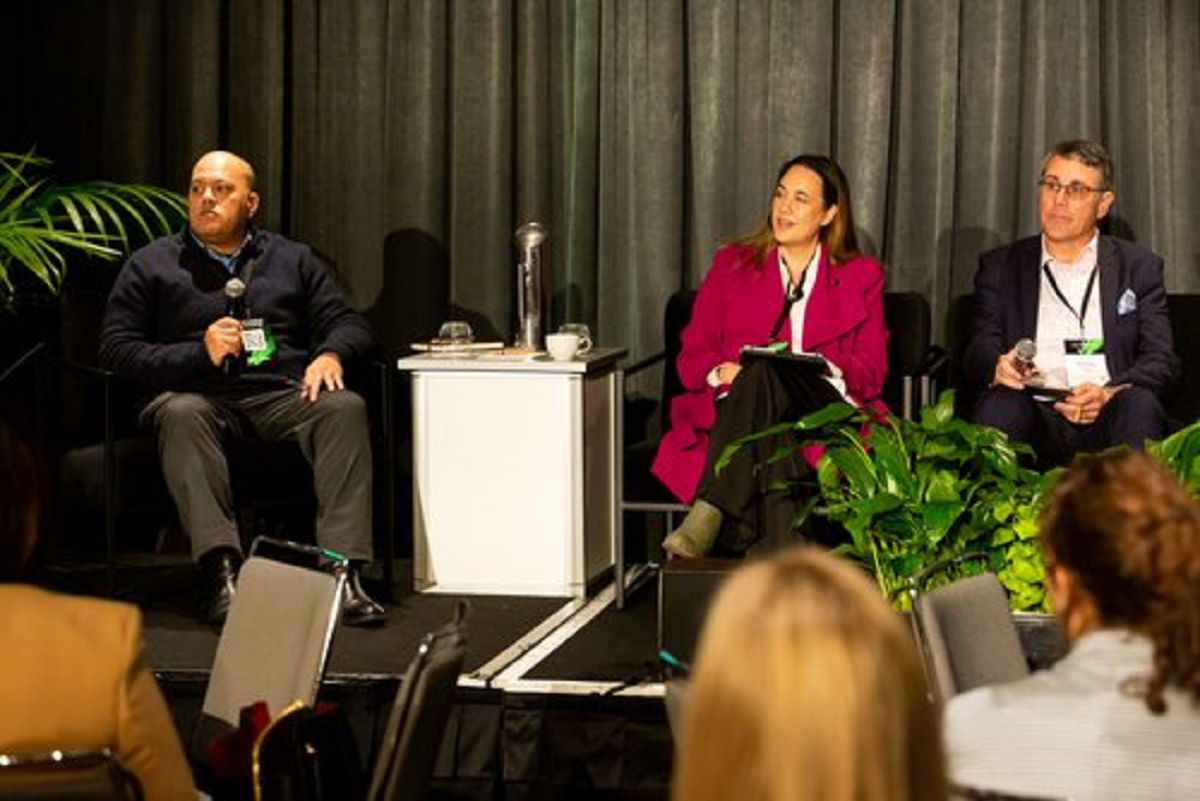
(Image Māori panel L-R: Moka Apiti, Elle Archer and Dr Karaitiana Taiuru).
In a rapidly evolving digital landscape, the fusion of traditional wisdom with artificial intelligence (AI) is more important than ever. This dynamic convergence was at the heart of a thought-provoking discussion at the recent Aotearoa Artificial Intelligence Summit in Auckland featuring the insights of Dr. Karaitiana Taiuru, Elle Archer, and Moka Apiti.
Dr. Karaitiana Taiuru, an authority on Māori rights in AI and Data Sovereignty, articulated the significance of Te Tiriti o Waitangi (the Treaty of Waitangi) in the context of AI. His words reminded us that recognising Māori data as taonga (treasure) imbued with Te Tiriti rights is a moral imperative. The intersection of AI and indigenous rights is a pivotal moment in our history, as affirmed by the Waitangi Tribunal.
Elle Archer, with her experience as Chair of Te Matarau (The Māori Tech Association) and background in Science and Geospatial Technology, urged us to see beyond the surface. She emphasised that AI isn’t just a tool; it’s a conduit for cultural preservation and inclusivity. Elle’s message resonates with the idea that AI should be a means to strengthen communities and honour cultural diversity.
Moka Apiti, Managing Director of Digital Navigators and a Geographic Information Systems (GIS) consultant, drew a poignant analogy, taking us on a journey of parenthood. His description of Māori data governance and sovereignty echoed the universal human values of trust and respect. His story illustrates that Māori data isn’t a mere commodity; it’s a legacy that impacts generations. Thus, recognising Māori data sovereignty is about being a responsible steward of collective wisdom.
As we embrace AI, we must build bridges of trust with Māori communities and all indigenous peoples. Here’s what I heard from the panellists:
Start with Relationship Building: Engage in meaningful conversations and understand the values, needs, and aspirations of the communities you wish to collaborate with. Begin with a cup of tea, a genuine connection, and respect for their perspectives.
Engage Early and Sustainably: Don’t wait until you’re knee-deep in a project to involve Māori communities. Engage them from the outset and commit to long-term partnerships. Be an active, consistent presence in their world.
Support Reciprocation: Recognise that communities may not operate on a 9-to-5 schedule. Respect their time, acknowledge their contributions, and reciprocate the trust and support they offer.
Seek Māori Expertise, But Don’t Overburden: Don’t make a single Māori staff member the sole resource for all things Māori. Diversify your sources of knowledge, but also be mindful of the pressure such staff may face.
Learn and Respect the Basics: Invest time in learning about the local iwi, the marae, and the Māori language. Pronouncing names correctly and using basic Māori words can demonstrate your good intentions.
Think Beyond the City: Remember that your impact extends beyond urban centers. Consider the needs and perspectives of rural and remote communities when designing AI solutions.
Prioritise Wisdom Over Intelligence: AI should serve as a tool to amplify collective wisdom. Strive for solutions that empower communities, promote inclusivity, and respect cultural diversity.
In conclusion, the intersection of Māori wisdom and artificial intelligence represents an exciting opportunity for innovation and collaboration. By building relationships grounded in trust, respect, and reciprocity, we can harness the potential of AI to preserve and celebrate cultural heritage while advancing toward a future that truly values collective intelligence.
Source: The Culture+ Design Lab






